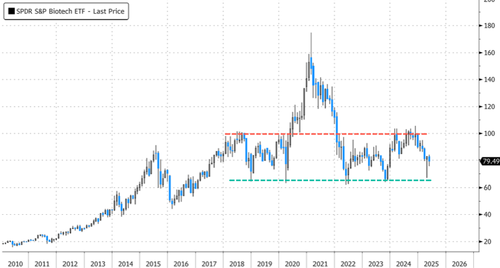The IPO and secondary equity markets for biotech and biopharma have been in a deep freeze this year, and any thawing isn't expected to materialize until 2026.
Multiple headwinds are weighing on the biotech world, including Health and Human Services Secretary Robert F. Kennedy Jr.'s cautious stance on vaccines and obesity drugs as he shifts focus toward overhauling America's food supply through the MAHA Report. Meanwhile, President Trump's revival of the Most Favored Nation drug pricing initiative has added another layer of uncertainty, further slowing investments in the pharmaceutical industry.
Key factors weighing on sentiment include:
The Trump administration's proposals to slash FDA funding and staff.
Health Secretary Robert F. Kennedy Jr.'s skepticism toward vaccines and obesity drugs.
Pricing uncertainty tied to Trump's Most Favored Nation policy.
Bloomberg data shows that only five biotech firms have raised over $50 million through IPOs so far this year, following just 18 deals in all of 2024. That's a stark contrast to the pandemic-era boom when bulls drove nearly 150 biotech companies public between 2020 and 2022.
Jason Fenton, Cantor Fitzgerald's co-head of equity capital markets, pointed out that too many biotechs went public during the Covid bubble, and many of the firms that IPO'd between 2020 and 2021 are now down an average of 40%.
Despite current challenges, long-term structural tailwinds remain:
Big pharma is under pressure to replenish pipelines as patents expire.
Capital flows into biotech remain strong.
Later-stage biotech names with clearer clinical paths are attracting more attention.
"At some point, likely in 2026, we're going to see a return to a normal biotech IPO market," said Fenton, adding that the average number of biotech IPOs per year between 2017 and 2019 ranged from 30 to 40.
Notably, the April monthly chart for the SPDR S&P Biotech ETF (XBI) appears to have formed a technical bottom. The question now is whether that low will hold, especially in a bearish regulatory landscape shaped by RFK Jr.'s leadership at HHS.
Loading...
